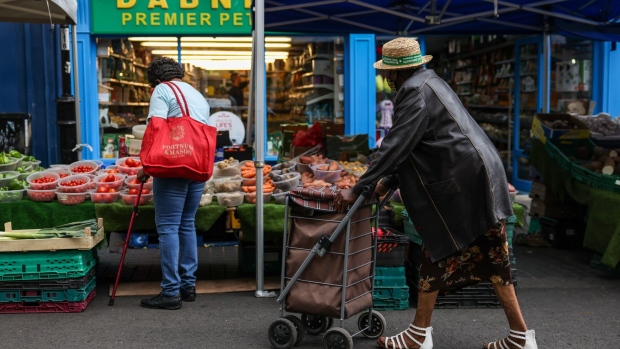Mar 27, 2023
Inflation in UK Shops Hits Record High With More Pain to Come
, Bloomberg News

(Bloomberg) -- Prices in UK stores are rising at a record pace in a sign that the cost-of-living crisis is far from over.
The British Retail Consortium said shop price inflation accelerated to 8.9% this month, a fresh peak for an index that started in 2005, and an increase from 8.4% in February.
The inflationary crunch has prompted shoppers to buy fewer items, according to one of the country’s best-known online grocers. Ocado Group Plc said Tuesday morning that the average number of items purchased per customer at its tie-up with Marks & Spencer Group Plc fell by 7.5% in the first quarter.
Hannah Gibson, chief executive officer at Ocado Retail, said during a phone call with journalists that cost pressures were still coming through and could lift prices even higher for customers.
Market data shows that British shoppers are increasingly turning to discount grocers. Lidl was the fastest-growing supermarket during the four weeks to March 19, Kantar said Tuesday, with sales rising by 25.8%.
Meanwhile, Aldi’s market share reached another all-time high. The two German discounters have a combined market share of 17.3%.
Sticky Inflation
Grocery price inflation reached 17.5%, another fresh record, according to the data compiled by Kantar.
It followed the figures overnight from the BRC, which showed food prices rising 15% in March after fruit and vegetables fell into short supply.
“Food price inflation is high, feels quite sticky, and as such can be expected to take some months to notably ease off, given the time lag of cost recovery,” Shore Capital analyst Clive Black wrote in a note to clients.
Overall UK inflation rose unexpectedly in February for the first time in four months, led by food and drink prices.
The average UK household has £76 ($94) less spare cash each month than a year ago, according to analysis by Retail Economics.
“Shop price inflation has yet to peak,” said Helen Dickinson, chief executive officer at the BRC. “Food price rises will likely ease in the coming months, particularly as we enter the UK growing season, but wider inflation is expected to remain high.”
Prices rose particularly sharply in March for chocolate, sweets and fizzy drinks due to the rising cost of sugar. Fruit and vegetables also became more expensive after weak supplies of tomatoes, cucumbers and peppers from Spain and north Africa led to gaps on shelves. Imports grew pricey due to the weakening pound.
Read More: Breakfast Index Reaches New High After UK Food Shortages
Energy bills remain elevated despite government support, putting extra pressure on consumers. UK shoppers are already expecting their personal finances to deteriorate over the next year under the weight of rising prices.
The Bank of England raised rates last week, predicting the UK economy will avoid a recession for now. It said last month that inflation should fall below 4% by the end of the year, but many Britons remain worried. A survey by Deltapoll conducted in the last week showed that, on average, people expect inflation of 9.4% a year from now.
Chocolate Eggs
Customers are already shopping “little and more often” for their groceries as they shrink their basket sizes to cope with constrained budgets, said Mike Watkins, head of retailer and business insight at NielsenIQ, which produces the data for the BRC. Some retailers are offering discounts and promotions to encourage people to spend at Easter, he said.
Chocolate egg sales volume is already up 6% compared to a year earlier, according to Fraser McKevitt, head of retail and consumer insight at Kantar. Hot cross bun sales are up by 5%.
(Adds more detail from fourth paragraph.)
©2023 Bloomberg L.P.


